ECO mode Citroen C4 PICASSO RHD 2015 1.G User Guide
[x] Cancel search | Manufacturer: CITROEN, Model Year: 2015, Model line: C4 PICASSO RHD, Model: Citroen C4 PICASSO RHD 2015 1.GPages: 428, PDF Size: 10.09 MB
Page 102 of 428
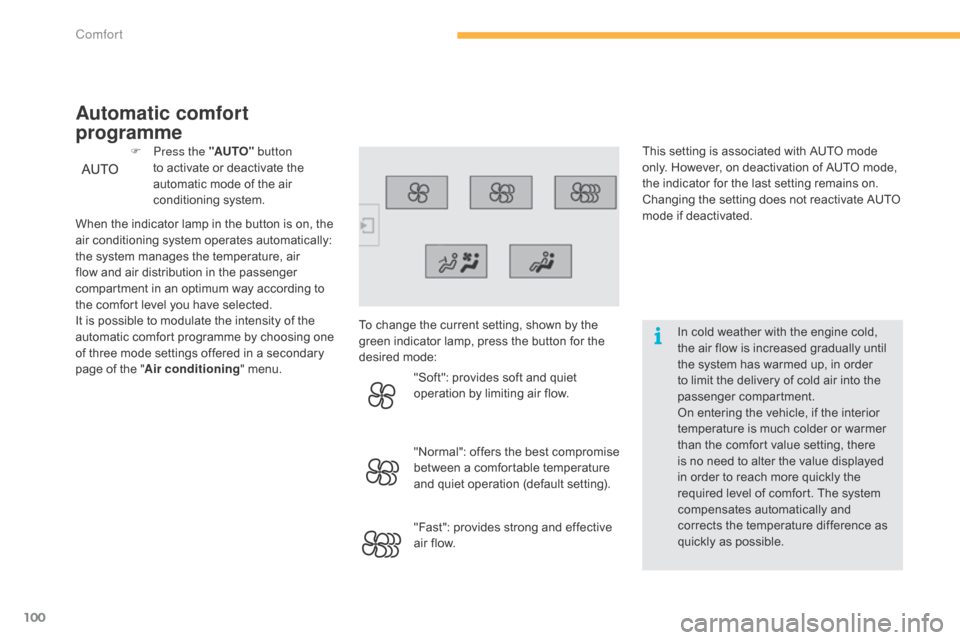
100
In cold weather with the engine cold, the air flow is increased gradually until
t
he system has warmed up, in order
t
o limit the delivery of cold air into the
p
assenger
c
ompartment.
On
entering the vehicle, if the interior
t
emperature is much colder or warmer
t
han the comfort value setting, there
i
s no need to alter the value displayed
i
n order to reach more quickly the
r
equired level of comfort. The system
c
ompensates automatically and
c
orrects the temperature difference as
q
uickly as possible.
This
setting is associated with AUTO mode
o
nly.
However, on deactivation of AUTO mode,
t
he
indicator for the last setting remains on.
Changing the setting does not reactivate AUTO
m
ode
if deactivated.
When
the
indicator
lamp
in
the
button
is
on,
the
a
ir
conditioning
system
operates
automatically:
t
he
system
manages
the
temperature,
air
f
low
and
air
distribution
in
the
passenger
c
ompartment
in
an
optimum
way
according
to
t
he
comfort
level
you
have
selected.
It
is
possible
to
modulate
the
intensity
of
the
a
utomatic
comfort
programme
by
choosing
one
o
f
three
mode
settings
offered
in
a
secondary
p
age
of
the
" Air conditioning "
menu.
F
P
ress the "AUTO"
button
to
activate
or
deactivate
the
a
utomatic
mode
of
the
air
c
onditioning
system.
Automatic comfort
programme
To change the current setting, shown by the g
reen indicator lamp, press the button for the
de
sired
m
ode:"Soft":
provides soft and quiet
o
peration by limiting air flow.
"Normal":
o
ffers
t
he
b
est
c
ompromise
b
etween a comfortable temperature
a
nd quiet operation (default setting).
"Fast":
provides strong and effective
a
ir flow.
Comfort
Page 104 of 428
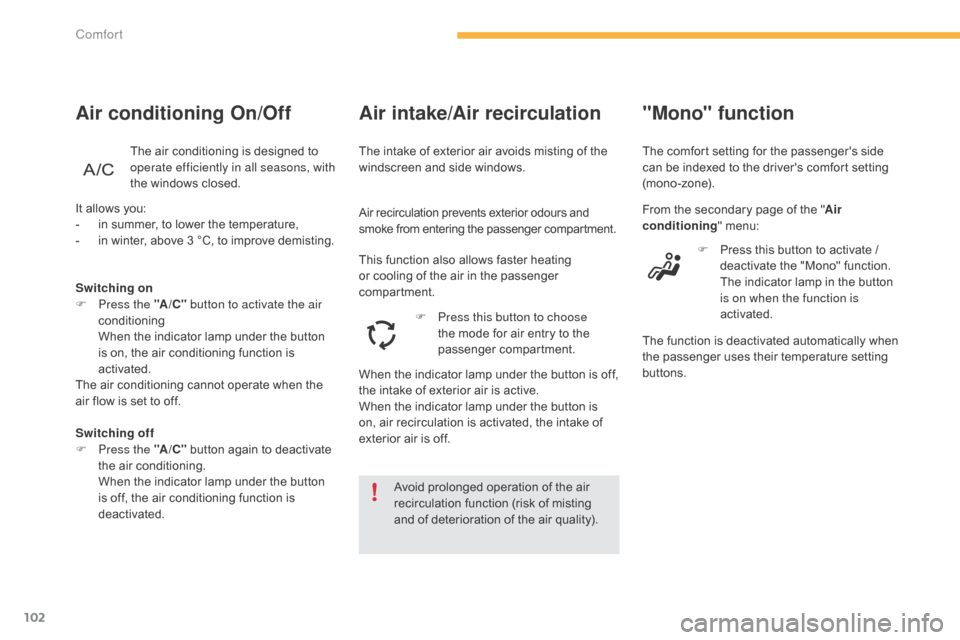
102
Avoid prolonged operation of the air recirculation function (risk of misting
a
nd of deterioration of the air quality).
"Mono" function
The comfort setting for the passenger's side can be indexed to the driver's comfort setting
(
mono-zone).
From
the secondary page of the "Air
conditioning "
menu:
F
P
ress this button to activate /
d
eactivate the "Mono" function.
T
he indicator lamp in the button
i
s on when the function is
activated.
The
function is deactivated automatically when
t
he
p
assenger
u
ses
t
heir
t
emperature
se
tting
b
uttons.
It
allows
you:
-
i
n
summer,
to
lower
the
temperature,
-
i
n
winter,
above
3
°C,
to
improve
demisting.
Switching off
F
P
ress the "A /C "
button
again
to
deactivate
t
he
air
conditioning.
W
hen
the
indicator
lamp
under
the
button
i
s
off,
the
air
conditioning
function
is
d
eactivated.
Switching on
F
P
ress the " A/C" button to activate the air
conditioning
W
hen
the
indicator
lamp
under
the
button
i
s
on,
the
air
conditioning
function
is
a
ctivated.
The
air
conditioning
cannot
operate
when
the
a
ir
flow
is
set
to
off.
Air conditioning On/Off
The air conditioning is designed to o perate efficiently in all seasons, with
the
windows closed. The
intake of exterior air avoids misting of the w
indscreen and side windows.
Air intake/Air recirculation
Air recirculation prevents exterior odours and s
moke from entering the passenger compartment.
This
function also allows faster heating
o
r cooling of the air in the passenger
c
ompartment. F
P
ress this button to choose
the
mode for air entry to the
p
assenger
c
ompartment.
When
the indicator lamp under the button is off,
t
he intake of exterior air is active.
When
the indicator lamp under the button is
o
n, air recirculation is activated, the intake of
e
xterior air is off.
Comfort
Page 133 of 428
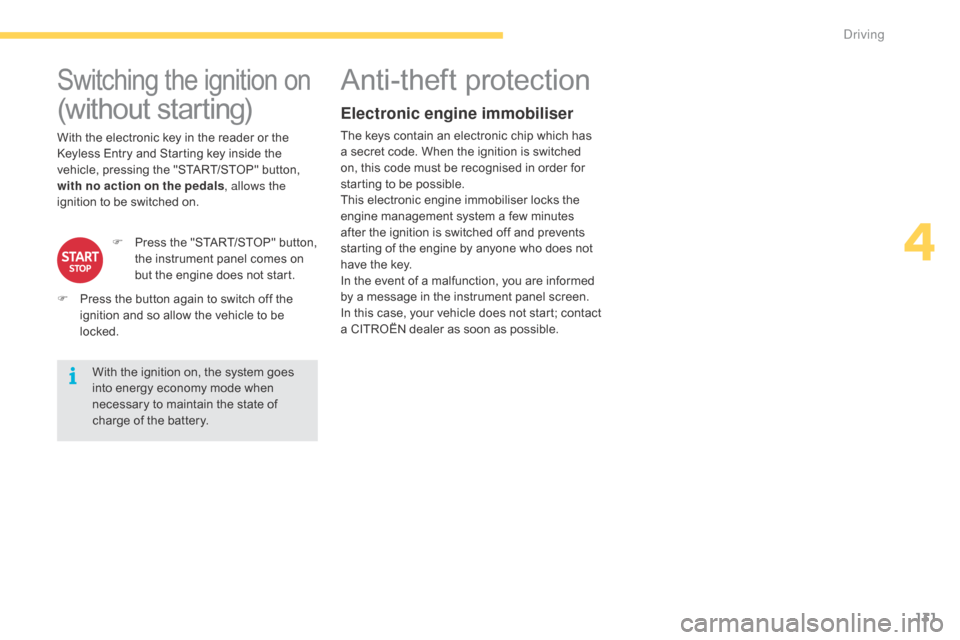
131
Switching the ignition on
(without starting)
With the ignition on, the system goes into energy economy mode when
n
ecessary to maintain the state of
c
harge of the battery.
With
the electronic key in the reader or the
K
eyless Entry and Starting key inside the
v
ehicle, pressing the "START/STOP" button,
w
ith no action on the pedals
, allows the
ignition to be switched on.
F
P
ress the "START/STOP" button,
t
he instrument panel comes on
b
ut the engine does not start.
F
P
ress the button again to switch off the
i
gnition and so allow the vehicle to be
lo
cked.
Anti-theft protection
Electronic engine immobiliser
The keys contain an electronic chip which has a
secret code. When the ignition is switched
o
n, this code must be recognised in order for
s
tarting to be possible.
This
electronic engine immobiliser locks the
e
ngine management system a few minutes
a
fter the ignition is switched off and prevents
s
tarting of the engine by anyone who does not
h
ave the key.
In
the event of a malfunction, you are informed
b
y a message in the instrument panel screen.
In
t
his
c
ase,
y
our
v
ehicle
d
oes
n
ot
s
tart;
c
ontact
a
CITROËN dealer as soon as possible.
4
Driving
Page 150 of 428
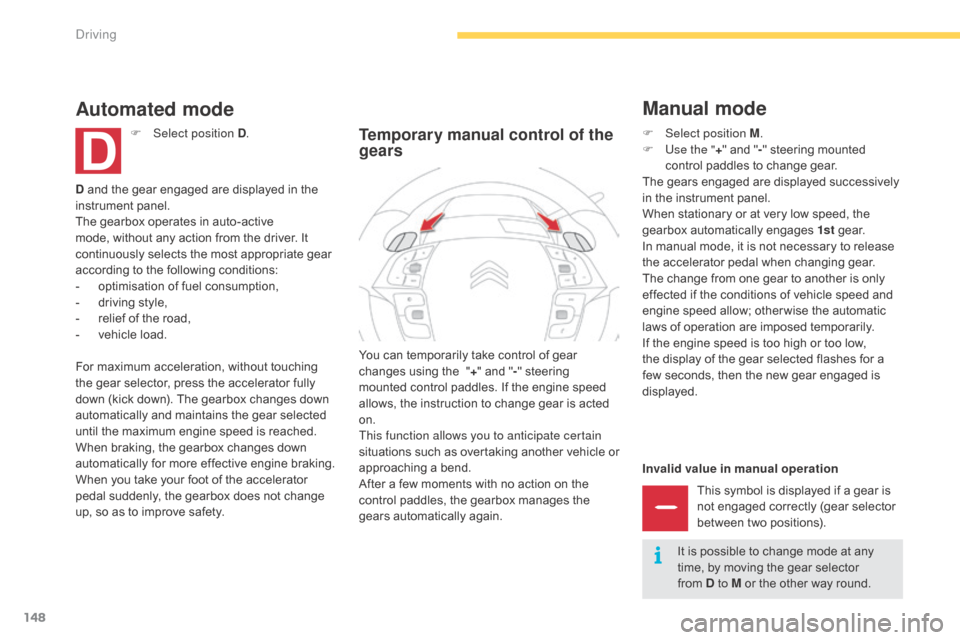
148
Invalid value in manual operationThis symbol is displayed if a gear is
n
ot engaged correctly (gear selector
b
etween two positions).
You
can
temporarily
take
control
of
gear
c
hanges
using
the
"
+"
and
"
- "
steering
m
ounted
control
paddles.
If
the
engine
speed
a
llows,
the
instruction
to
change
gear
is
acted
o
n.
This function allows you to anticipate certain
situations
s
uch
a
s
ov
ertaking
a
nother
v
ehicle
o
r
a
pproaching
a
bend.
After
a
few
moments
with
no
action
on
the
c
ontrol
paddles,
the
gearbox
manages
the
g
ears
automatically
again.
Temporary manual control of the
gears
Manual mode
D and the gear engaged are displayed in the in strument pan el.
The
gearbox operates in auto-active
m
ode, without any action from the driver. It
c
ontinuously selects the most appropriate gear
a
ccording to the following conditions:
-
o
ptimisation of fuel consumption,
-
d
riving style,
-
r
elief of the road,
-
v
ehicle load.
Automated mode
F Select position D .
For
maximum acceleration, without touching
t
he
gear
selector, press the accelerator fully
d
own
(kick down). The gearbox changes down
a
utomatically and maintains the gear selected
u
ntil
the
maximum engine speed is reached.
When
braking, the gearbox changes down
a
utomatically for more effective engine braking.
When
you take your foot of the accelerator
p
edal
suddenly, the gearbox does not change
u
p,
so
as
to improve safety. F
Sel ect position M.
F
U
se the "+"
and "- "
steering mounted
c
ontrol paddles to change gear.
The
gears engaged are displayed successively
i
n the instrument panel.
When
stationary or at very low speed, the
g
earbox automatically engages 1st
g
e a r.
In
manual mode, it is not necessary to release
t
he accelerator pedal when changing gear.
The
change from one gear to another is only
e
ffected if the conditions of vehicle speed and
e
ngine speed allow; other wise the automatic
l
aws of operation are imposed temporarily.
If
the engine speed is too high or too low,
t
he display of the gear selected flashes for a
f
ew seconds, then the new gear engaged is
d
isplayed.It
is possible to change mode at any
t
ime, by moving the gear selector
f
rom D to M or the other way round.
Driving
Page 151 of 428
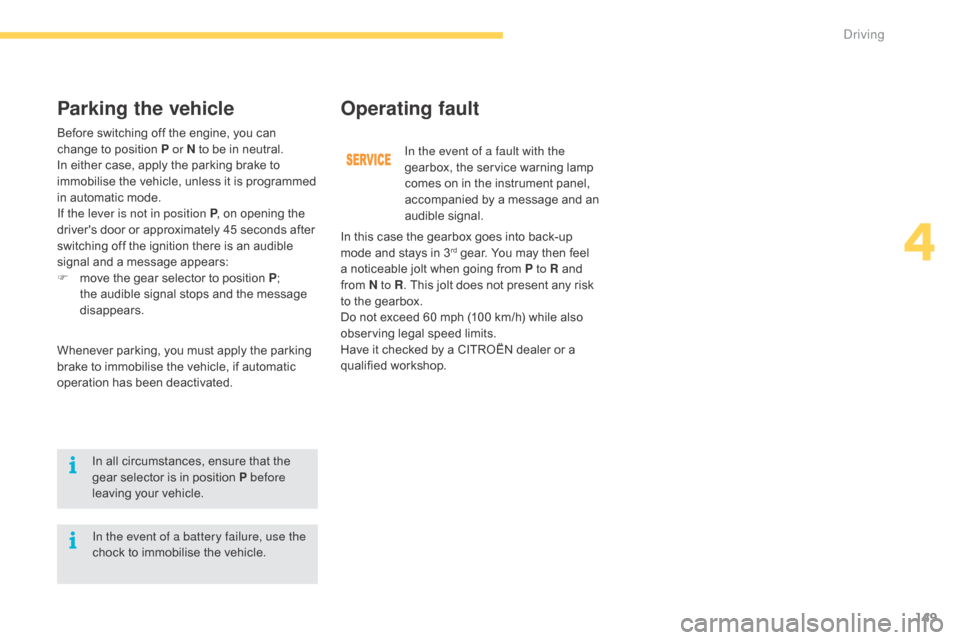
149
Before switching off the engine, you can change to position P or N to be in neutral.
I
n either case, apply the parking brake to
i
mmobilise the vehicle, unless it is programmed
i
n automatic mode.
If the lever is not in position P ,
on opening the
d
river's door or approximately 45 seconds after
s
witching off the ignition there is an audible
s
ignal and a message appears:
F
m
ove the gear selector to position P;
t
he audible signal stops and the message
d
isappears.
Operating fault
Whenever parking, you must apply the parking brake to immobilise the vehicle, if automatic
o
peration has been deactivated.
Parking the vehicle
In all circumstances, ensure that the gear selector is in position P before
leaving
your vehicle. In the event of a fault with the
gearbox,
the service warning lamp
c
omes on in the instrument panel,
a
ccompanied by a message and an
a
udible
s
ignal.
In this case the gearbox goes into back-up
m
ode and stays in 3
rd gear. You may then feel a
noticeable
jolt
when going from P to R and
f
rom N to R .
This
jolt
does not present any risk
t
o
the
gearbox.
Do
not
exceed
60
mph (100 km/h) while also
o
bserving
legal
speed limits.
Have
it
checked
by
a
CITROËN dealer or a
q
ualified
w
orkshop.
In the event of a battery failure, use the
chock
to
immobilise
the
vehicle.
4
Driving
Page 152 of 428
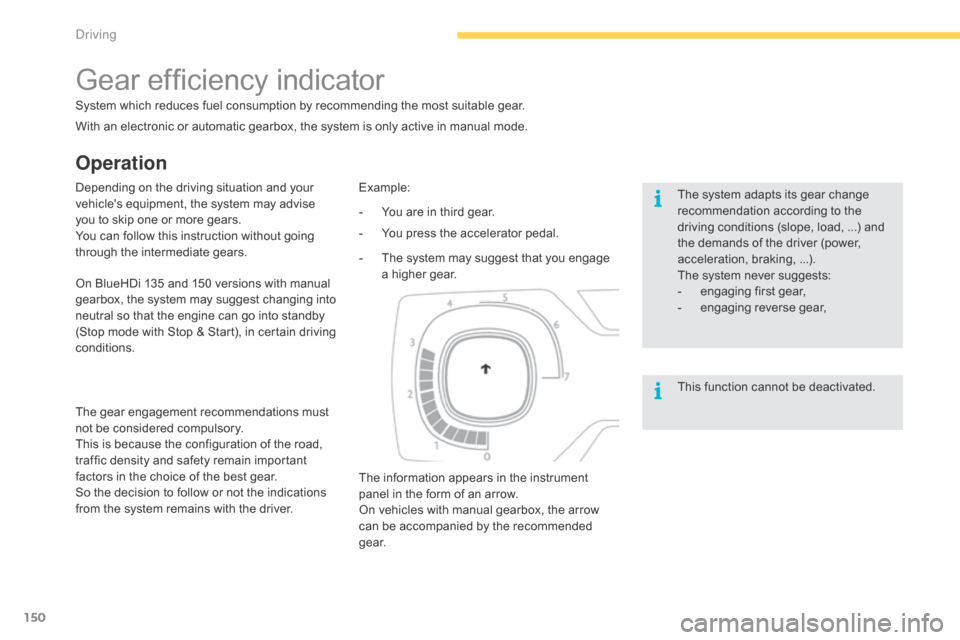
150
Operation
Gear efficiency indicator
System which reduces fuel consumption by recommending the most suitable gear.
T he system adapts its gear change
r
ecommendation according to the
d
riving conditions (slope, load, ...) and
t
he demands of the driver (power,
a
cceleration, braking, ...).
The
system never suggests:
-
e
ngaging first gear,
-
enga
ging
r
everse
g
ear,
Example:
The
information appears in the instrument
p
anel in the form of an arrow.
On
vehicles with manual gearbox, the arrow
c
an be accompanied by the recommended
g
e a r.
Depending
on the driving situation and your
v
ehicle's equipment, the system may advise
y
ou to skip one or more gears.
You
can follow this instruction without going
t
hrough the intermediate gears.
The
gear engagement recommendations must
n
ot be considered compulsory.
This
is because the configuration of the road,
t
raffic density and safety remain important
f
actors in the choice of the best gear.
So
the decision to follow or not the indications
f
rom the system remains with the driver.-
Y
ou are in third gear.
-
Y
ou press the accelerator pedal.
-
T
he system may suggest that you engage
a
higher gear.
With
an electronic or automatic gearbox, the system is only active in manual mode.
On
BlueHDi 135 and 150 versions with manual
g
earbox,
t
he
s
ystem
m
ay
s
uggest
c
hanging
i
nto
n
eutral so that the engine can go into standby
(
Stop
m
ode with Stop
&
S
tart),
i
n
c
ertain driving
c
onditions. This
function cannot be deactivated.
Driving
Page 153 of 428
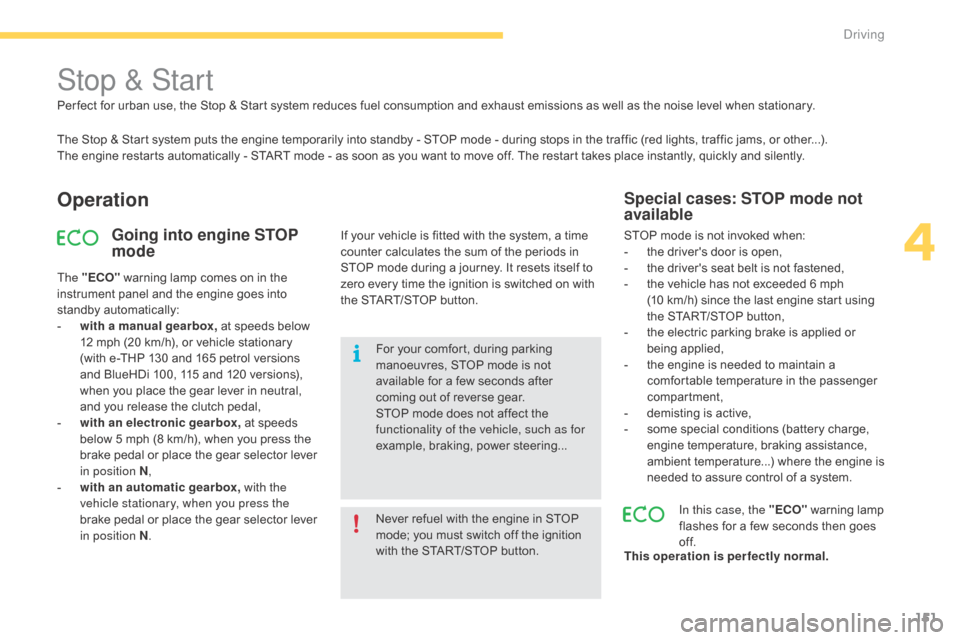
151
Stop & Start
The Stop & Start system puts the engine temporarily into standby - STOP mode - during stops in the traffic (red lights, traffic jams, or other...).
T he engine restarts automatically - START mode - as soon as you want to move off. The restart takes place instantly, quickly and silently.
Operation
Going into engine STOP
mode
The "ECO" warning lamp comes on in the i
nstrument panel and the engine goes into
s
tandby
a
utomatically:
-
w
ith a manual gearbox, at speeds below
1
2 mph (20 km/h), or vehicle stationary
(
with e-THP 130 and 165 petrol versions
a
nd BlueHDi 100, 115 and 120 versions),
w
hen you place the gear lever in neutral,
a
nd you release the clutch pedal,
-
w
ith an electronic gearbox, at speeds
b
elow 5 mph (8 km/h), when you press the
b
rake pedal or place the gear selector lever
i
n position N ,
-
w
ith an automatic gearbox, with the
vehicle stationary, when you press the
brake
pedal or place the gear selector lever
i
n position N . Never
refuel with the engine in STOP
m
ode; you must switch off the ignition
w
ith the START/STOP button.
For
your comfort, during parking
m
anoeuvres, STOP mode is not
a
vailable for a few seconds after
c
oming out of reverse gear.
STOP
mode does not affect the
f
unctionality of the vehicle, such as for
example,
braking, power steering...
Special cases: STOP mode not
available
STOP mode is not invoked when:
- t he driver's door is open,
-
t
he driver's seat belt is not fastened,
-
t
he vehicle has not exceeded 6 mph
(
10 km/h) since the last engine start using
t
he START/STOP button,
-
t
he electric parking brake is applied or
be
ing
a
pplied,
-
t
he engine is needed to maintain a
c
omfortable temperature in the passenger
c
ompartment,
-
d
emisting is active,
-
s
ome special conditions (battery charge,
e
ngine temperature, braking assistance,
a
mbient temperature...) where the engine is
n
eeded to assure control of a system.
In this case, the "ECO"
warning lamp
f
lashes for a few seconds then goes
o
f f.
This operation is perfectly normal.
Per fect
for
urban
use,
the
Stop
&
Start
system
reduces
fuel
consumption
and
exhaust
emissions
as
well
as the noise level when stationary.
If
your
vehicle
is
fitted
with
the
system,
a
time
c
ounter
calculates
the
sum
of
the
periods
in
S
TOP
mode
during
a
journey.
It
resets
itself
to
z
ero
every
time
the
ignition
is
switched
on
with
t
he
START/STOP
button.
4
driving
Page 154 of 428
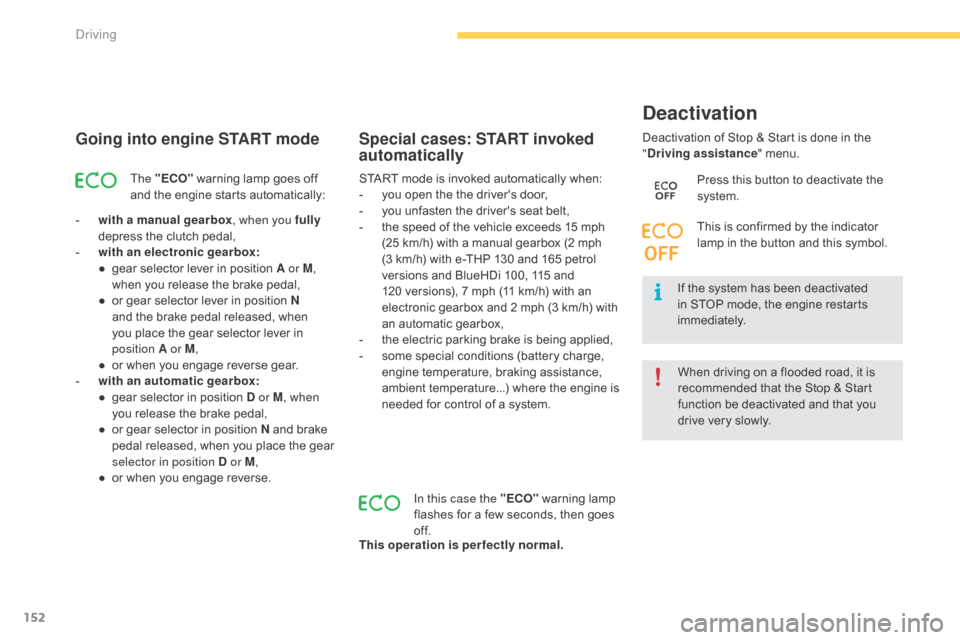
152
Going into engine START mode
The "ECO" warning lamp goes off a
nd the engine starts automatically:
-
w
ith a manual gearbox , when you fully
depress
the clutch pedal,
-
w
ith an electronic gearbox:
●
g
ear selector lever in position A or M,
when
you release the brake pedal,
●
o
r
gear selector lever in position N
and
the brake pedal released, when
y
ou place the gear selector lever in
p
osition
A or M ,
●
o
r
when you engage reverse gear.
-
w
ith an automatic gearbox:
●
g
ear selector in position D or M, when
you
release the brake pedal,
●
o
r
gear selector in position N and brake
p
edal released, when you place the gear
s
elector in position D or M ,
●
o
r
when you engage reverse. START
mode is invoked automatically when:
- y ou open the the driver's door,
-
y
ou unfasten the driver's seat belt,
-
t
he speed of the vehicle exceeds 15 mph
(
25 km/h) with a manual gearbox (2 mph
(
3 km/h) with e-THP 130 and 165 petrol
v
ersions and BlueHDi 100, 115 and
1
20 versions), 7 mph (11 km/h) with an
e
lectronic gearbox and 2 mph (3 km/h) with
a
n automatic gearbox,
-
t
he electric parking brake is being applied,
-
s
ome special conditions (battery charge,
e
ngine temperature, braking assistance,
a
mbient temperature...) where the engine is
n
eeded for control of a system.
Special cases: START invoked
automatically
If the system has been deactivated in STOP mode, the engine restarts
i
mmediately.
Deactivation
of Stop & Start is done in the
"
D
riving assistance
" menu.
Deactivation
In this case the "ECO"
warning lamp f
lashes for a few seconds, then goes
o
f f.
This operation is perfectly normal. Press
this button to deactivate the
s
ystem.
This is confirmed by the indicator
l
amp in the button and this symbol.
When driving on a flooded road, it is
r
ecommended that the Stop & Start
f
unction be deactivated and that you
d
rive very slowly.
Driving
Page 156 of 428
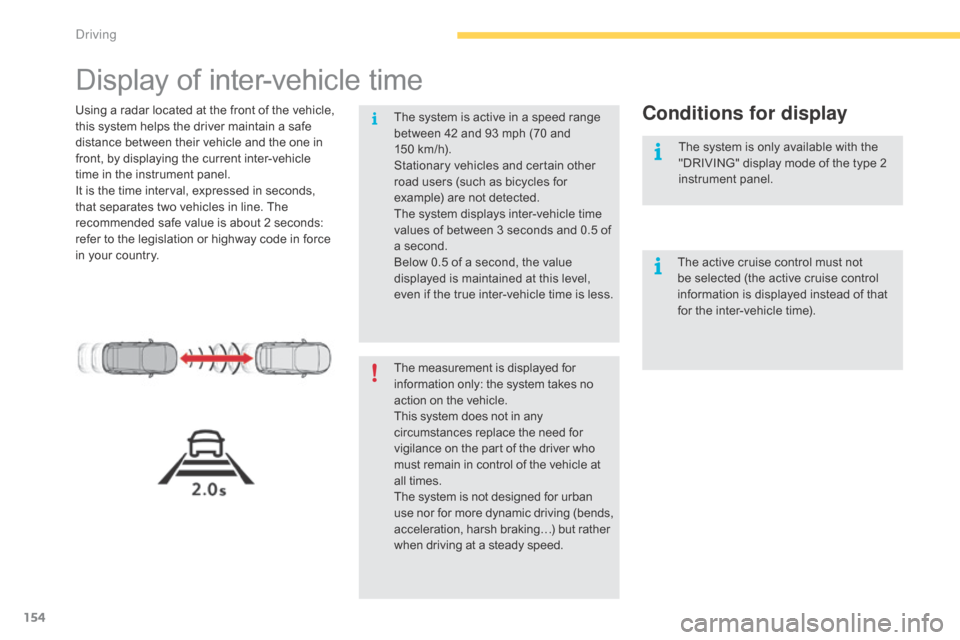
154
Display of inter-vehicle time
Using a radar located at the front of the vehicle, this system helps the driver maintain a safe
d
istance between their vehicle and the one in
f
ront, by displaying the current inter-vehicle
t
ime in the instrument panel.
It
is the time interval, expressed in seconds,
t
hat separates two vehicles in line. The
r
ecommended safe value is about 2 seconds:
r
efer to the legislation or highway code in force
i
n your country.Conditions for display
The measurement is displayed for information only: the system takes no a
ction on the vehicle.
This
system does not in any
c
ircumstances replace the need for
v
igilance on the part of the driver who
m
ust remain in control of the vehicle at
a
ll times.
The
system is not designed for urban
u
se
nor
for
more
dynamic
driving
(bends,
a
cceleration, harsh braking…) but rather
w
hen driving at a steady speed.
The
system is active in a speed range
b
etween 42 and 93 mph (70 and
1
50 km/h).
Stationary vehicles and certain other
r
oad users (such as bicycles for
e
xample) are not detected.
The system displays inter-vehicle time
v
alues of between 3 seconds and 0.5 of
a
second.
Below 0.5 of a second, the value
d
isplayed is maintained at this level,
e
ven if the true inter-vehicle time is less.
The active cruise control must not
b
e selected (the active cruise control
i
nformation is displayed instead of that
f
or the inter-vehicle time).
The system is only available with the
"
DRIVING" display mode of the type 2
in
strument
pan
el.
Driving
Page 164 of 428
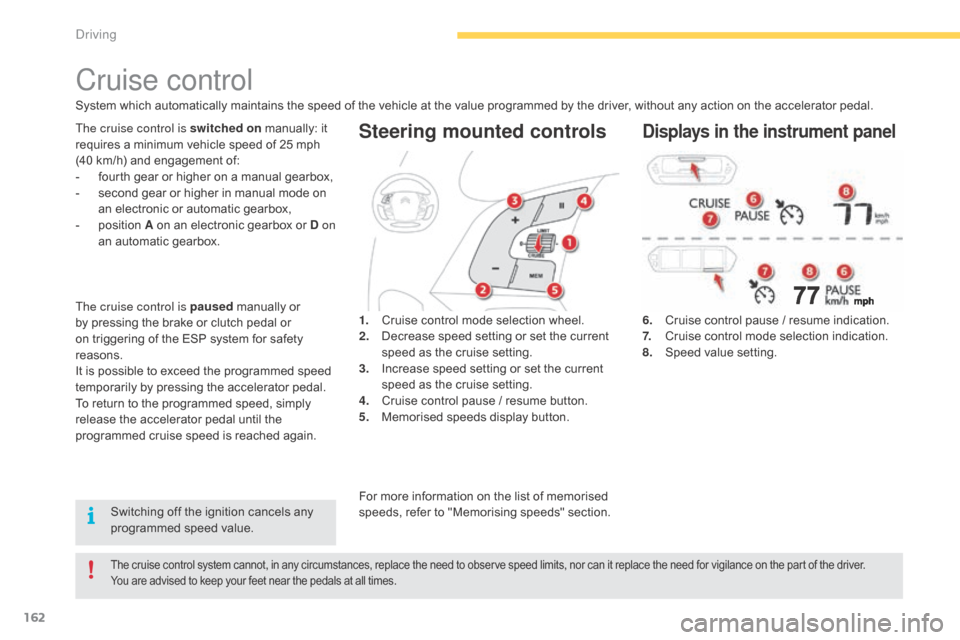
162
Steering mounted controls
6. Cruise control pause / resume indication.
7. C ruise control mode selection indication.
8.
S
peed value setting.
Cruise control
System which automatically maintains the speed of the vehicle at the value programmed by the driver, without any action on the accelerator pedal.
The cruise control system cannot, in any circumstances, replace the need to observe speed limits, nor can it replace the need for vigilance on the part of the driver.
Y ou are advised to keep your feet near the pedals at all times.
The cruise control is switched on manually: it r
equires a minimum vehicle speed of 25 mph
(
40 km/h) and engagement of:
-
f
ourth gear or higher on a manual gearbox,
-
s
econd gear or higher in manual mode on
a
n electronic or automatic gearbox,
-
p
osition A on an electronic gearbox or D on
an
automatic gearbox. 1.
C
ruise control mode selection wheel.
2.
D
ecrease speed setting or set the current
s
peed as the cruise setting.
3.
I
ncrease speed setting or set the current
s
peed as the cruise setting.
4.
C
ruise control pause / resume button.
5.
M
emorised speeds display button.Displays in the instrument panel
Switching off the ignition cancels any programmed speed value.
The cruise control is paused
manually or
b
y
pressing the brake or clutch pedal or
o
n
triggering of the ESP system for safety
r
easons.
It
is
possible to exceed the programmed speed
t
emporarily by pressing the accelerator pedal.
To
return to the programmed speed, simply
r
elease the accelerator pedal until the
p
rogrammed cruise speed is reached again.
For more information on the list of memorised s
peeds, refer to "Memorising speeds" section.
Driving